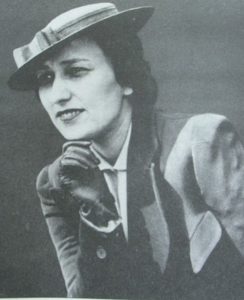
Effa Manley
*Effa Manley was born on this date in 1900. She was a Black business entrepreneur, and Manley was the only female owner in the history of the Negro Leagues.
Manley was from Philadelphia and rarely discussed her heritage, and most people assumed she was a Mulatto, light-skinned Black. Young Effa was raised in a household with a Black stepfather and half-siblings. After graduating from high school in Philadelphia, she moved to New York to work in the millinery business. She met Abe Manley, 24 years older than her, at the 1932 World Series at Yankee Stadium.
They married on June 15, 1935. Abe had money through several successful investments in real estate and "numbers banking," or racketeering. Together, they started a Negro League team in Brooklyn in 1935, naming the team the Eagles. The Eagles played in Ebbets Field yet could not compete with the Brooklyn Dodgers fans, and the Manleys moved the team to survive financially. They bought the Newark Dodgers, a Black semi-pro team, and moved the Eagles to Newark in 1936. Effa and Abe ran the Eagles from 1935-48.
Her influence extended beyond baseball; she was also active in the Black civil rights movement. She took over the team's day-to-day business operations, arranged playing schedules, planned travel, managed and met the payroll, bought the equipment, negotiated contracts, and handled publicity and promotions. Thanks to her rallying efforts, more than 185 VIPs -- including New York Mayor Fiorello LaGuardia, who threw out the first pitch, and Charles C. Lockwood, justice of the Supreme Court of the State of New York, were on hand to watch the Eagles’ inaugural game in 1935. But the Eagles could not rise to the occasion and dropped the opener to the Homestead Grays, 21-7. Although many of the men in the sport resented her and complained loudly about her brashness, they respected her.
Manley was also a social activist. As part of her work for the Citizen’s League for Fair Play, Manley organized a 1934 boycott of Harlem stores that refused to hire Black salesclerks. After six weeks, the owners of the stores gave in, and a year later, 300 stores on 125th Street employed Blacks. Manley was the treasurer of the Newark chapter of the National Association for the Advancement of Colored People (NAACP) and often used Eagles games to promote civic causes. In 1939, Manley held an "Anti-Lynching Day" at Ruppert Stadium. Several stories about her have become part of Negro League folklore. One such tale is that she provided the Eagles with an air-conditioned, $15,000 Flexible Clipper bus, a first for the Negro Leagues in 1946.
Worried about what her players would do for employment during the off-season, she and Abe sponsored a team in the Puerto Rican winter leagues. She and Abe served as godparents to Larry Doby’s first child. They loaned Monte Irvin money for a down payment on his first house. During World War II, Negro Leagues' attendance reached all-time highs. By the war's end, the leagues were a $2 million enterprise and represented one of the largest Black-dominated businesses in the U.S. After the war, integration of Major League baseball became a hot-button issue. The color line was broken in 1946 when Branch Rickey signed Jackie Robinson to play for Montreal, the Dodgers’ Triple-A International League team. That year was a watershed one for Manley and the Eagles, too.
Newark beat the Kansas City Monarchs in a thrilling, seven-game Negro League World Series. Robinson broke into the Major Leagues with the Brooklyn Dodgers in 1947. Integration took its toll on the Negro Leagues. Attendance at Eagles games plummeted from 120,000 in 1946 to 57,000 in 1948, and Newark, like many other Negro League teams, could not generate profits. After Rickey successfully recruited pitcher Don Newcombe away from Newark and convinced him to join the Dodgers, Manley took action. She wrote letters to Rickey asking him to meet with her. Rickey did not respond, but Manley continued to fight for just compensation and speak out against the raiding of Negro League teams without reparation. Cleveland Indians owner Bill Veeck called Manley in 1947, inquiring about Larry Doby. They agreed to a deal that ultimately paid the Manleys $15,000 in exchange for Doby, who became the first Black player in the American League.
The deal established a precedent, and Major League owners then paid an average of $5,000 for each Negro Leaguer they signed. The Eagles folded in 1948, and several other teams in the Negro National League followed suit. Throughout her years in the business, Manley kept a baseball scrapbook. This is now part of the National Baseball Hall of Fame collection in Cooperstown, N.Y. Until her death in April 1981 at 81, Manley devoted herself to keeping the history of Negro League baseball alive.
In 1976 she published "Negro Baseball ... before Integration," which listed 73 players she felt were qualified for the Hall of Fame. She wrote numerous letters to the Baseball Hall of Fame and publications such as The Sporting News, urging recognition for the league and its players. The Hall of Fame enshrined 11 players from the Negro Leaguers in 1973. In 1985, the Hall of Fame added an exhibit on Black baseball. Her photo is prominently displayed in the exhibit.
The Negro Baseball Leagues A Photographic History
By Phil Dixon with Patrick J. Hannigan
Copyright 1992, Jed Clauss and Joanna Paulsen
Ameron House Publishing
ISBN 0-88488-0425-2